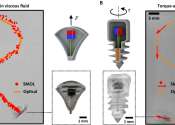A brain stimulator powered by breath instead of batteries
Implantable deep brain stimulators can help many people with neurological and psychiatric disease when traditional treatments fail. But surgery every time the batteries need to be changed is a major drawback. Now, UConn researchers ...
Nov 7, 2022
0
101









